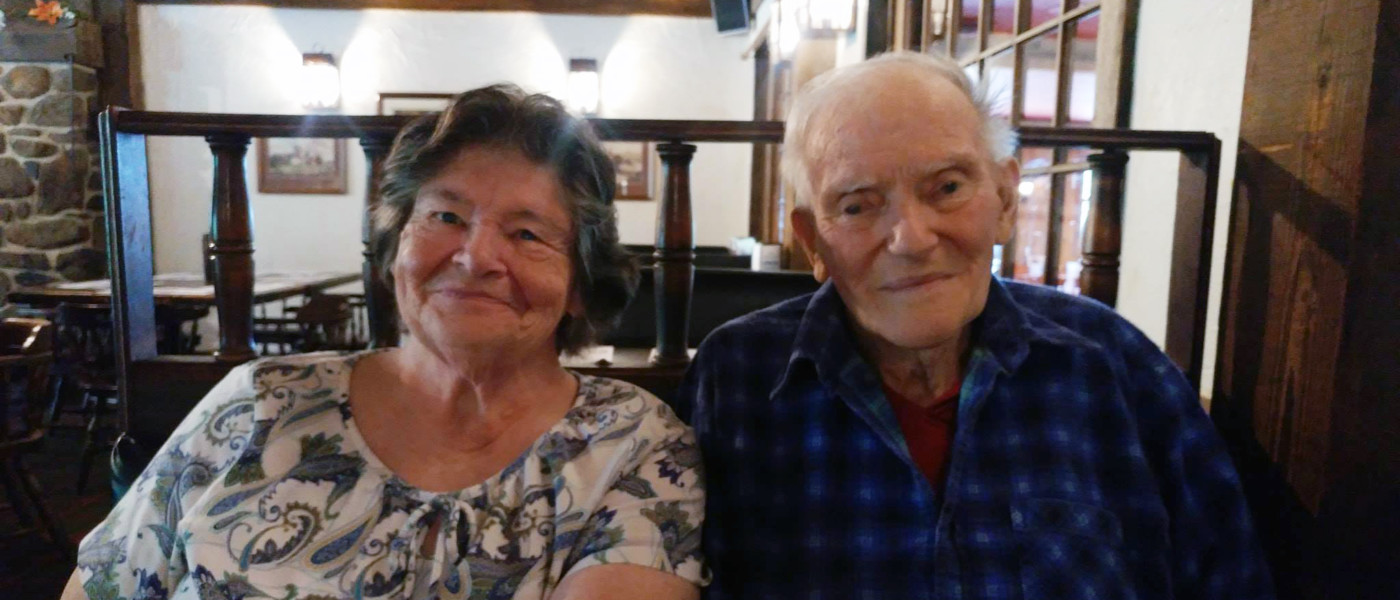Below is a Farmer Hero profile of the MacMillan family of Cherry Hill Farm, by guest writer, Judith Friebert. Judith is an artist who became friends with the MacMillans when she asked to sketch their beautiful farm. Learn more about Judith in her bio at the bottom of this page.
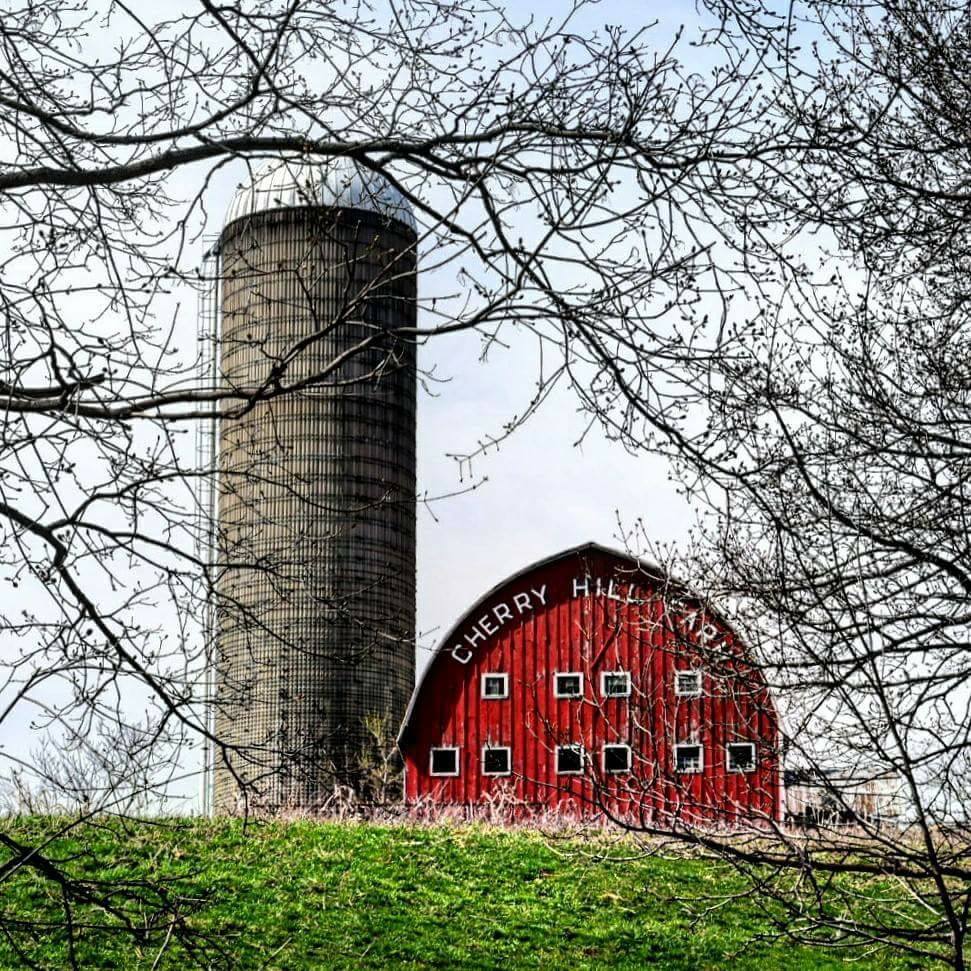
Cherry Hill Farm barn in better days. Photo: Sharon Kimball
Doug and Marilyn MacMillan of Lunenburg, Massachusetts, owners of Cherry Hill Farm for over fifty years, were honored last September at the annual fall harvest festival held by their neighbors, the Stillmans, owners of the other active dairy farm in town. The joyful time seemed to cap off a pretty good year for the MacMillans. Despite Doug’s failing health, things were on the upswing at their farm. Their son Raymond, in charge of operations for several years now, was enjoying the updated milking equipment just installed and paid for by a grant obtained by their grandson, Ian. Their older daughter Sharon Kimball and her husband, Charles, had moved back to the area to work on the farm, making life much easier for Ray.
A little over a month after the festival, on a beautiful sunny Sunday, Ray opened the gate to the pasture to let his cows wander freely over the farm’s sparkling green hills. He returned to the barn with his daughter Grace for the usual round of chores. As they mucked the stalls and spread fresh hay for bedding, they heard an ominous sound of crackling and shifting coming from the base of one of the silos. Realizing instantly that the silo was about to collapse, they rushed to shoo heifers out the barn door. Once outside, Ray persuaded Eggo, an older cow, to move from her favorite spot just under the trajectory of the crumbling silo. Out of habit she quickly returned, but Ray didn’t have time to go back. He and Grace ran as far from the barn as they could and phoned for help. Thirteen heifers were still inside.
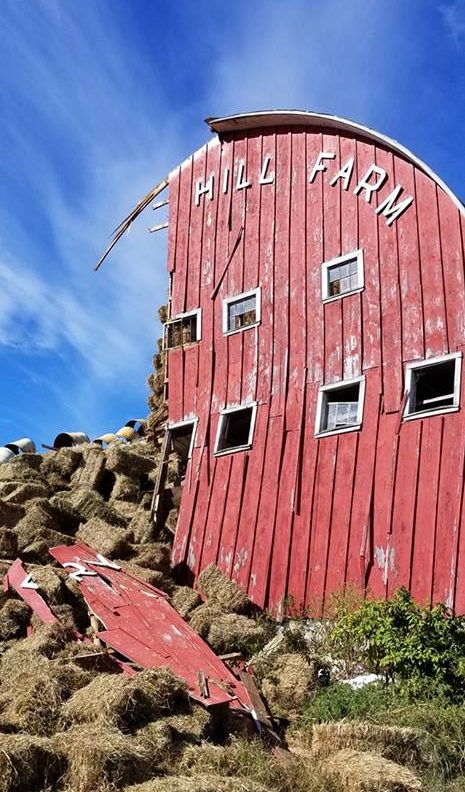
The barn demolished by the collapsed silo. Photo: Leominster Firefighters Local 1841
The concrete and steel silo, stuffed with winter grain just harvested, began to give way. Sheets of curly-cued metal strips sprang out, spewing grain. Chunks of concrete pummeled the east side of the barn, cascading stored bales of hay and debris. Ray and Grace’s calls alerted emergency crews and family and friends, including Charles, who received the call while at church with Sharon and Ian. “The silo is about to collapse,” Ray told Charles as a fire truck and ambulance careened past Lunenburg United Church. Sick with anxiety, Ian raced to the scene. He was the one responsible for the grant to rehab the barn. All for nothing, he feared. Not to mention the lives of beloved family members and animals.
At the top of the long driveway, Ian couldn’t believe what he saw. The damage was extensive. He joined his uncle and the rescue teams already there. The thirteen heifers still in the barn were the first priority. It took more than two hours, but they lured the calves to safety; only eleven-year-old Eggo did not survive.
See the farm from a bird’s-eye view in this video shot in November 2016:
The community responded immediately. For the next several days hundreds of people arrived to help. There were lines of cars parked down on the main road. People brought so much food the MacMillans had to turn some of it away. They even received milk from generous farmers who knew that, ironically, the family wouldn’t have any of their own. There would be no milk checks for a long while. Offers to shelter and milk the cows came from miles around. The MacMillans’ Jerseys went home with the Stillmans, who would add them to their herd; three other farms took the rest of the milkers. Newspaper and TV reports proliferated, and multiple fundraising campaigns were set up, the first one surpassing its goal of $10,000 in just a few days. Hollis Hills Farm owner Jim Lattanzi brought the herd’s “teenagers” to his place near Fitchburg and organized a fundraiser that attracted more than 1,000 supporters.
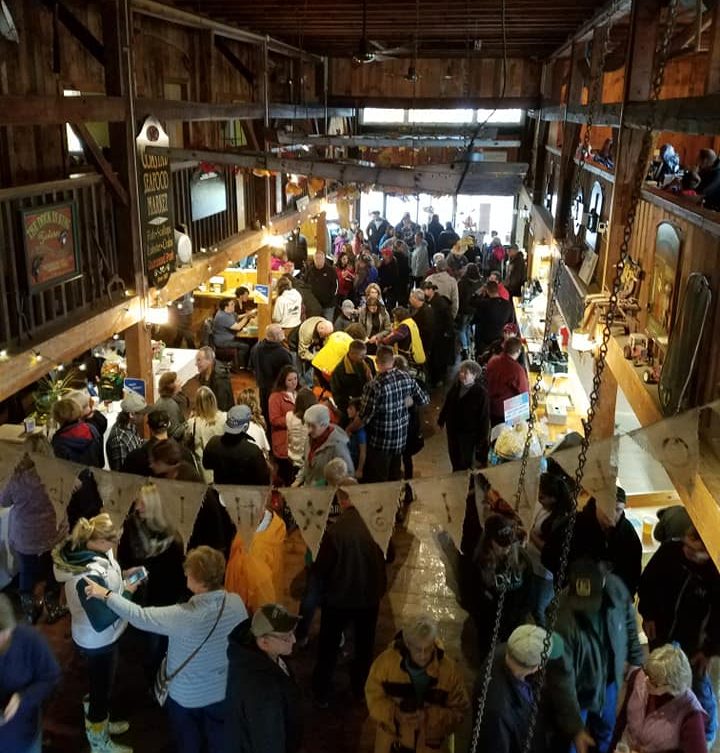
A fundraising event held for Cherry Hill Farm.
This outpouring demonstrates how much people care about the MacMillans; the reasons for their admiration are multifaceted. As Jim Lattanzi put it in a TV interview after the incident, Marilyn and Doug taught him all he knew about farming when he was just starting out and had helped him ever since at the drop of a hat. He explained that the entire community benefits by preservation of open space and the rural character that townspeople cherish. Jim went on to say that such a tragedy adds injury to a business that is and has been extremely fragile–especially over the past few years and particularly for farmers like the MacMillans who have no control of their own market because they depend on processors to pick up, process and distribute their milk. Farm Aid has documented the immense pressure dairy farmers have been under thanks to consolidation in the dairy industry and especially low prices over the past four years.
Doug and Marilyn’s intelligence and knowledge of the business, their sense of humor, and strong family ties are significant factors in their farm’s longevity.
Doug’s dad Robert was the first generation of MacMillans to work the land known as Cherry Hill Farm. Robert was a Scottish immigrant to Canada who served in World War I. Upon his return, he started a dairy farm in Quebec with the help of the Soldier Settlement Board, which was established in Canada in 1917 to assist returned servicemen to set up farms. Later, Robert sold that farm and moved his family to Massachusetts to become the farm manager for the Brown family. When the Browns put it up for sale, Robert purchased the farm—Cherry Hill Farm, with its three houses, a barn and more than 90 acres. Doug learned the ropes from his father, in Canada and later at Cherry Hill Farm. To this day he prizes the marvelous old photos of his parents, and the draft horses that pulled his father’s plow. In his early twenties, Doug met Marilyn at the Lunenburg Grange. They married in 1956, and for more than fifty years this indomitable team managed the farm, with Marilyn caring for the family, performing farm chores and maintaining the essential paperwork that keeps a farm running. Not only did they provide feed for their animals, but also vegetables and pigs for themselves and their children.
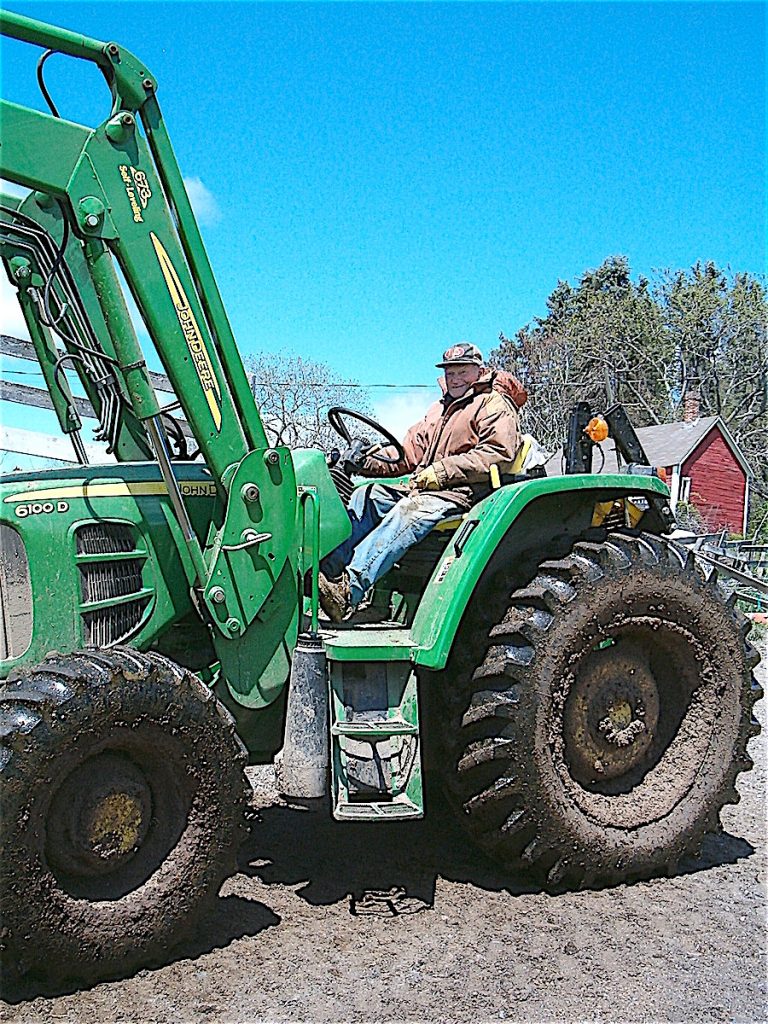
Doug MacMillan. Photo: Judith Friebert
Located high up on a hill that gives it its name, Cherry Hill Farm overlooks its own verdant green fields extending to Leominster Road below. The layers of treetops and rolling terrain provide a glorious vista to the horizon. In back of the main barn, now impaired, lies the fenced-off living space for dry cows, a newly rehabbed barn, and two modest homes, one for the elder MacMillans and the other for Ray. Between them Marilyn’s magnificent garden astounds in the growing season. Behind to the west, yet another barn appears to lean into the broad slope that holds the sun behind it at sundown, and is bristly with corn come fall. At one time, there were numerous dairy farms visible across the landscape.
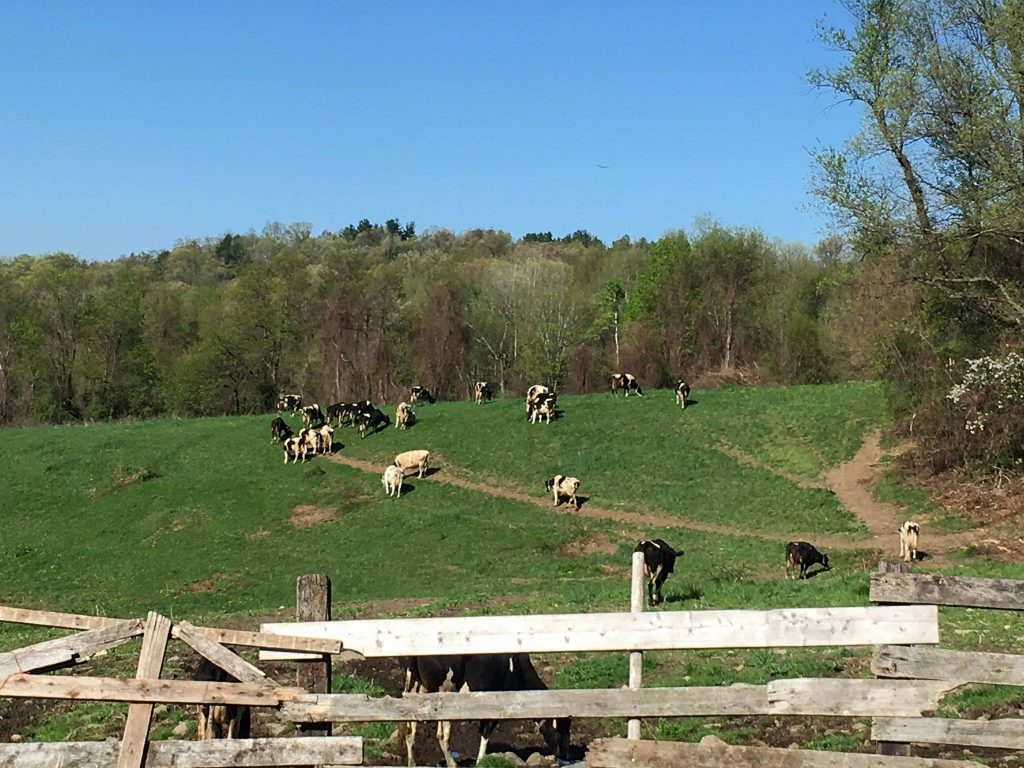
Cows on pasture of Cherry Hill Farm. Photo: Sharon Kimball
In 1988 or so, Willie Nelson became involved in the publication of a book to educate young adults about the importance of family farms. He helped select three farms from across the country, including the MacMillans,’ to demonstrate this theme. The American Family Farm was published by Harcourt Brace Jovanovich in 1989. On a cool day in October around 2000, on my very first visit up there to draw, Doug invited me into the house to warm up and proudly showed me the book. Standing in their kitchen admiring the handsome photos of their farm, I was delighted to see the very same wallpaper, pictures, and table in the kitchen presented in the book over ten years earlier, giving me a sense of the history and strength of this family.
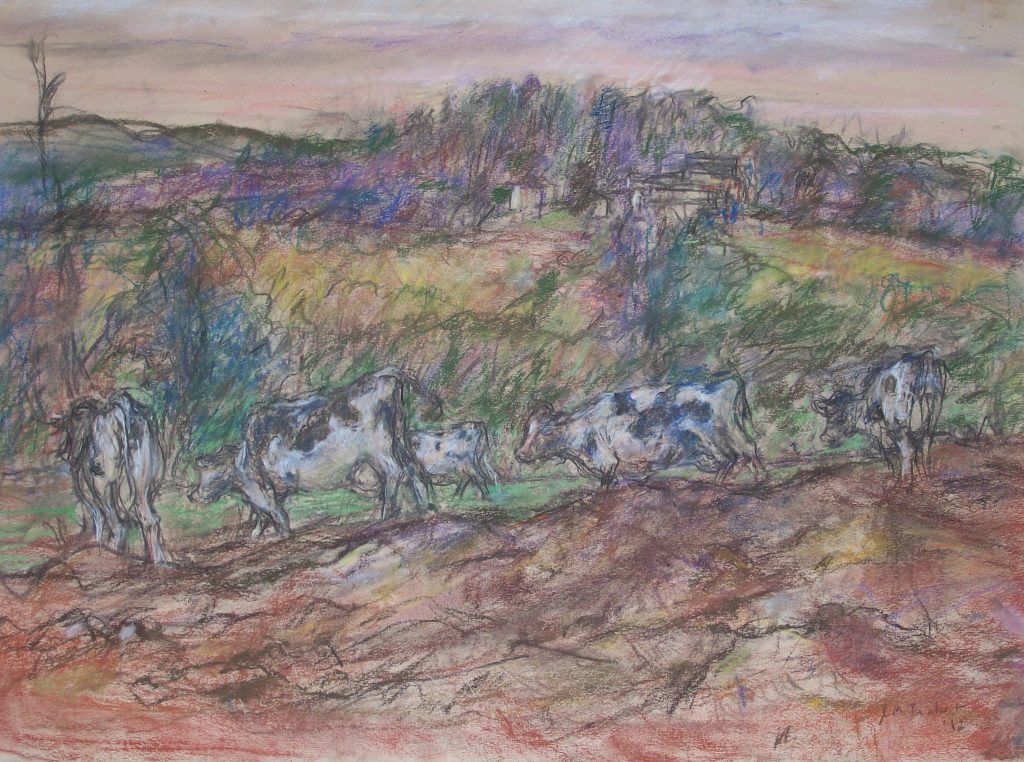
One of Judith’s sketches of Cherry Hill Farm.
Since my first visit, I have personally witnessed the MacMillans’ tremendous work ethic, how they creatively address challenges, and maintain a symbiotic relationship with the public. What I have seen is only a fraction of the picture. Before my time, the same main barn suffered a major fire in 1992, generating a similarly massive response. The family has endured the death of a child. It has undergone unexpected deaths of animals; pipeline intrusions requiring vigilance and legal action; countless local meetings of dairy farmers, and of course the constant rise and fall (but mostly fall) of the price of milk. They have also extended a hand to their neighbors, supplying their home-grown products such as hay.
They share many of these elements with other small farms. But as dairy farms disappeared around them, the MacMillans kept going. I am sure that the strong relationship between Doug and Marilyn is key. Doug and Marilyn’s intelligence and knowledge of the business, their sense of humor, and strong family ties are significant factors in their farm’s longevity. Both possess an encyclopedic memory of people and events through the years, and if on occasion they remember things differently, they good-naturedly dispute any matter across the kitchen table and come to some conclusion that appeals to both. They are extremely welcoming and eager to share their stories and the good food from their garden and table.
Doug and Marilyn raised five children, three boys and two girls, all of whom have been involved in the family farm. When they grew up all but one, Helen, a physician in North Carolina, stayed in the area, making certain that their kids, too, lent a hand. Ultimately, the needs of their own families took them off the farm to find work elsewhere, but the siblings were never far away. After a stint in the Navy, Ray MacMillan decided he wanted to pursue farming. Backed by the steadfast support of his parents, he began to take the reins. Doug helped him with chores for as long as he could, until ill health dragged him unwillingly off-duty. Ray has always faced the usual farming challenges, like harvesting the crops before falling rain or descending night, and of course, the continual breakdown of tractors and other machinery, with stoicism, cheerfulness, and his understated sense of humor.
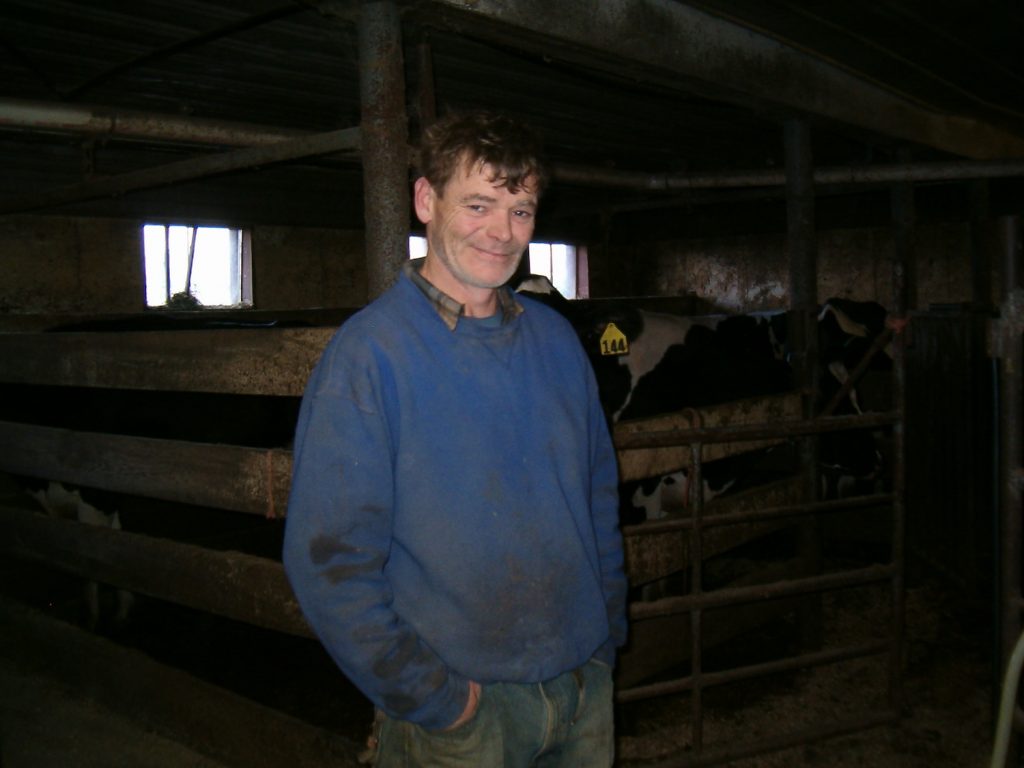
Ray MacMillan. Photo: Judith Friebert
Before that Sunday in October, the future looked bright. Along with the updated milking parlor, one of their other barns had been repaired for future use, also through a grant. Ray’s daughters Kathleen and Grace, now grown, had increased their participation on the farm. With the return of Ray’s sister Sharon, recently retired from her teaching position at the local high school, and her husband Charles, the farm’s team was strong.
The siblings were having enthusiastic conversations about exciting possibilities for the operation, such as milking fewer cows and creating a retail store to harness the opportunities generated by the buy-local movement. Eighty-five of the farm’s one-hundred-and-two acres are under an Agriculture Protection Restriction, which means the land can be used only for agricultural purposes. Many of us hope that looking up from Leominster Road, we will again see grazing cows on the slopes of Cherry Hill Farm. The incredible strength, determination and staying power of the MacMillan family gives possibility to that hope.
About Judith Friebert: I grew up in Milwaukee, Wisconsin, a daughter of two artists. On weekends my parents and I would drive into the countryside to sketch. We didn’t have to travel far to find dairy farms, which became my favorite subject. I earned a master’s degree in art from the University of Wisconsin and later a master’s in library science from Simmons College. When in 2000 I moved to Central Massachusetts for a library job, I sought out nearby dairy farms and came upon Doug, Marilyn, and Ray MacMillan and Cherry Hill Farm. I was deeply taken by the scenery and by the MacMillan family, who welcomed me with open arms. After that I was a regular visitor, able to wander across the fields to find views that I sketched in charcoal and pastel. I also learned from the MacMillans about the challenges of running small family dairy farms, motivating me to advocate for such farms. My artwork at Cherry Hill reflects what I find beautiful about the farm: not only the land’s breathtaking views but also the implicit quality of hard work, strength, and character of the people who created and maintain it.
Do you know someone who should be recognized as a Farmer Hero? Tell us about them!
